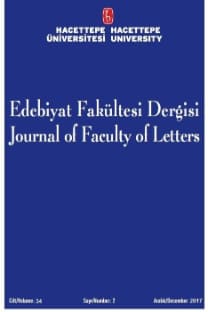From his Doctoral Thesis to The Fall: Evil through Albert Camus's Eyes
Bu yazının amacı, Albert Camus'nün yapıtlarında sürekli yer alan ve giderek gelişen 'kötülük' kavramını Camus'nün bakış açısından incelemektir. Camus kötülükten hep rahatsızlık duymuş, konuyu Hıristiyan Metafiziği ve Yeniplatonculuk başlıklı doktora tezinde ele almaya başlamış ve tamamlanmış son romanı Düşüş'te bu konudaki görüşlerini en derin biçimiyle okuyucuya sunmuştur. Bu yazıda Camus'nün farklı yapıtlarına da değinilmekle birlikte, doktora tezi ve Düşüş'e odaklanılmıştır. Camus öncelikle kötülüğün kaynağını bulmak ister. Konuyu dinsel yönden düşündüğünde kötülüğün Tanrı'dan gelemeyeceğini belirtir çünkü merhametli bir tanrıda kötülüğün de bulunması bir çelişki yaratmaktadır. Zaten Camus de bir ateist olarak Tanrı'ya inanmadığı için kaynağı başka yerlerde aramayı uygun bulur ve bu kez 'uyumsuz'un kötülüğe neden olup olamayacağını düşünür. Ancak, bu düşünceden kısa sürede vazgeçer çünkü uyumsuzun bir değer olduğunu, baştan yaşamı amaçsız ve boş kılan bir sonmuş gibi görünse de, temelde yaşama anlam katan, insanın kendi değerlerini kendisinin bulmasını sağlayan yeni bir başlangıç olduğunu belirtir. O halde, kötülük nereden gelmektedir? Camus'ye göre, kötülüğün iki kaynağı vardır: Ölüm ve insan. Bu iki kaynak birbiriyle iç içe geçmiş olduğundan, bir arada değerlendirilmelidir. Ölüm, kaçınılmaz oluşu nedeniyle, aslında bir korku ve dehşet kaynağıdır. İnsandan geleceğini çalar, onu umutsuzluk içinde bırakır. Kötülüğün ikinci kaynağı ise insandır; kötülüğü yüreğinde gizler ve ölümün saldığı dehşete karşı koyabilmek için her türlüsünü ortaya çıkarıp kullanmakta tereddüt etmez. Düşüş'ün kahramanı Clamence buna iyi bir örnektir. Bu yazı, Camus'nün kötülük kaynaklarının neler olduğunu incelemenin yanısıra, Camus'ye göre insanın kötülükten kaçıp kaçamayacağını, kötülüğe boyun eğmek zorunda olup olmadığını ve--varsa--kötülüğü yenmenin yollarının neler olabileceğini de işlemekte, bir yandan Camus'nün yapıtlarındaki kötülük kavramının niteliğine ışık tutmayı, diğer yandan da, Camus'nün günümüze dek neredeyse hiç el atılmamış olan doktora tezine dikkatleri çekmeyi istemektedir.
Doktora Tezinden Düşüş'e kadar Albert Camus'nün Gözünden Kötülük Kavramı
The purpose of this essay is to examine from Albert Camus's point of view, the problem of evil, as it keeps evolving throughout his works. First appearing in his doctoral thesis entitled Christian Metaphysics and Neoplatonism, and reaching its culmination in his last complete novel, The Fall, evil remains as an ever-disturbing problem for Camus. The essay touches on several of Camus's works on the problem of evil, but it keeps its focus on the two of his works mentioned above, namely, The Fall and his doctoral thesis.Camus scrutinizes evil by questioning its sources. When he considers the sources, he thinks it is almost impossible to posit the idea with the benevolent Christian God. What is more, being an atheist, he does not believe that God exists. These make him turn to other possible sources, and the second concept within which he searches for evil is the absurd. However, it does not take him long to place the absurd among values and not consider it as evil. The reason is that despite the fact that the absurd appears, at first glance, to be sheer meaninglessness, and thus, a kind of end, Camus can see that it is in fact a new beginning. It provides man with new energy and enthusiasm to start over and to furnish life with meaning and values of his own. What, then, generates evil? Camus states that evil comes from two sources: death and man. These two sources are closely related and should be considered together. He claims that death is a constant source of horror for man since it is unavoidable. It steals from man his future, makes life look futile and leaves no room for hope. Man, the second source, harbours evil in his heart. His fear of death may make him use any kind of malignancy in order to fight against it--a case we see in Clamence, the main character in The Fall. In addition to searching for its sources, Camus discusses whether man can evade evil or whether he is doomed to be subjugated by it. He also looks for ways of overcoming it--if there happens to be any. The essay attempts both to call attention to Camus's approach to evil and bring to light and give due emphasis to his doctoral thesis, which, so far, has remained almost untouched.
___
- Camus, A. (2008). Notebooks 1951-1959. Chicago: Ivan R. Dee. (The original published in 1989).
- Camus, A. (1976). The Fall. Harmondsworth, Middlesex: Penguin Books Ltd. (The original published in 1957).
- Camus, A. (1955). The Myth of Sisyphus. New York: Alfred A. Knopf. (The original published in 1942).
- Camus, A. (1967). The Rebel. New York: Alfred A. Knopf. (The original published in 1952).
- Corbic, A. (2007). Camus et l'homme sans Dieu. Paris: Les Éditions du Cerf.
- Kierkegaard, S. (1980). The Concept of Anxiety: A Simple Psychologically Orienting Deliberation on the Dogmatic Issue of Hereditary Sin. (R. Thomte, Ed./Trans.). New Jersey: Princeton University Press. (The original, n.d.)
- Masters, B. (1975). Camus: a study. Totawa, New Jersey: Rowman and Littlefield.
- McBride, J. (1992). Albert Camus Philosopher and Littérateur (Includes the First Complete English Translation of Camus's Christian Metaphysics and Neoplatonism). New York: St Martin's Press.
- Todd, O. (1999). Albert Camus: A Life. New York: Alfred A. Knopf.
- Weyembergh, M. (2009). Absurde. J. Guérin (Ed.), in Dictionnaire Albert Camus (pp. 7-10). Paris: Éditions Robert Laffont.
- ISSN: 1301-5737
- Yayın Aralığı: Yılda 2 Sayı
- Başlangıç: 1983
- Yayıncı: Emine Erdoğan Özünlü
Sayıdaki Diğer Makaleler
Uncompromising Worldviews of Clarissa Dalloway and Septimus Smith in Virginia Woolf 's Mrs. Dalloway
Hollanda'da Yaşayan Türklerin Geri Dönüş Konusundaki Niyetleri
Decadence of Victorian Masculinity, or Dandyism in Oscar Wilde's Lady Windermere's Fan
Siyasi Parti Başkanı, "Sosyalizm ve Sanat" Makalelerinin Yazarı Ressam Namık İsmail
From his Doctoral Thesis to The Fall: Evil through Albert Camus's Eyes
Türkiye Sanat Tarihinde Dönemler
Anzaklar ve Çanakkale: Anzak Günlüklerindeki Gerçekler
Eda KARACAN, Rahşan BEKTAŞ BALAMİR
Medieval Literary Representations of the Victimized Children in Middle English Metrical Romances
Osmanlı İskân Tarihine Dair Önemli Bir Kaynak: Timar Ruznamçe Defterleri
